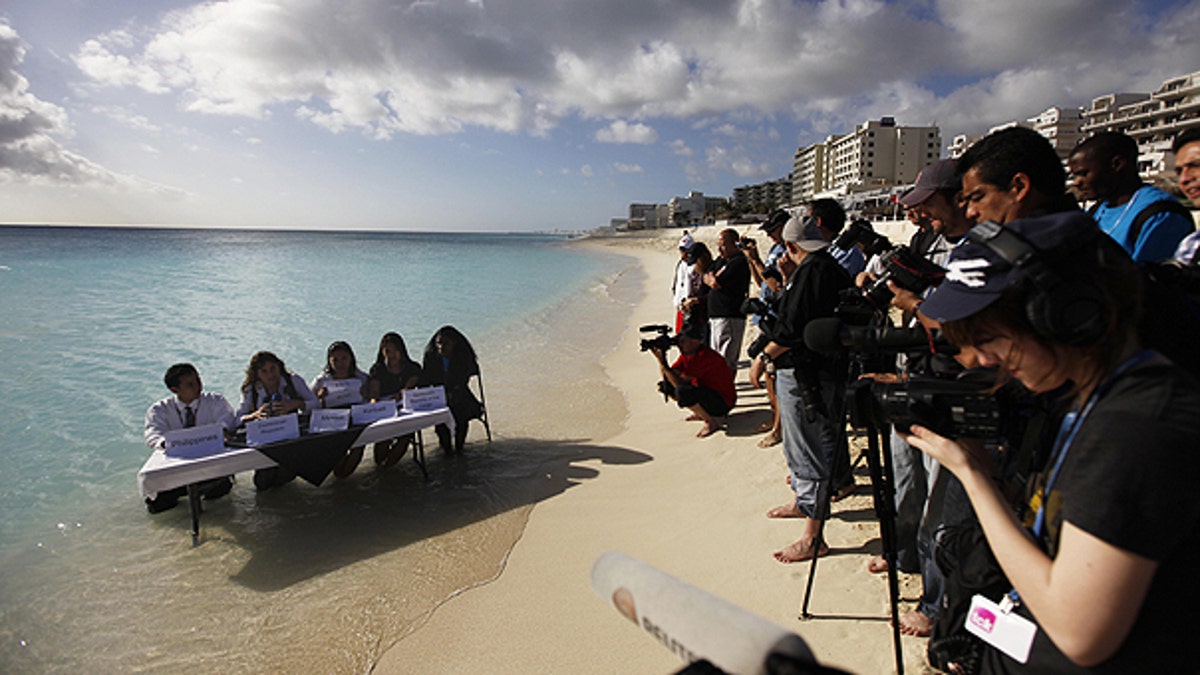
Dec. 9: Environmental activists from 350.org, left, demonstrate before the cameras of journalists during the United Nations Climate Change Conference in Cancun, Mexico. (AP)
CANCUN, Mexico – Climate talks went into their final day Friday with a raft of issues undergoing intense bargaining through the night, but with high hopes an agreement was within reach on measures to fight global warming.
In a late-night session, negotiating groups reported they had settled some disputed wording and clauses, but other knotty issues remained to be sorted out. One issue, related to pledges by industrial and developing countries to rein in emissions of heat-trapping gases, appeared deadlocked.
"We really do not have more time," said the conference chair, Mexican Foreign Secretary Patricia Espinosa, demanding that negotiators keep at it throughout the night to meet a Friday evening deadline.
The limited agenda of secondary issues the U.N. conference had set for itself was proving tougher than expected. It was clear in the final hours of the 193-nation congress that delegates were looking for creative language to finesse irreconcilable views and buy another year until the next major conclave in Durban, South Africa.
Norwegian Environment Minister Erik Solheim, a veteran of many diplomatic battles, urged negotiators to embrace flexibility. "If you want to pick fights in this audience it's very easy to do it. What we need is a spirit of compromise," he said to a round of applause.
Delegations were seeking decisions on governing a $100 billion annual fund for developing countries threatened by global warming, giving them patented green technology and compensation for halting the destruction of their forests for timber or for clearing agricultural land.
Even the forestry program, which had been touted as one of the easiest potential deals at Cancun, met last-minute hurdles over how to make sure that the rights of indigenous communities are safeguarded.
Off the agenda was any proposal for industrial countries to ramp up the modest pledges they made since the last annual meeting in Copenhagen for reducing greenhouse gas emissions that are causing a measurable rise in the Earth's average temperature.
That summit failed to produce a hoped-for overarching climate pact and instead concluded with a three-page political document, the Copenhagen Accord.
Achim Steiner, head of the U.N. Environment Program, said the issues in Cancun were substantive and not to be underplayed. But even if the conference program is adopted, nothing new would have been done to reduce emissions, he said.
"We all will leave Cancun knowing very clearly that we have not very significantly changed the time window within which the world will be able to address climate change," he said. "That challenge remains."
A key issue of contention was whether to make the post-Copenhagen national emissions pledges legally binding, and in what kind of document.
The answer to those questions would determine the fate of the Kyoto Protocol, the 1997 document that set reductions targets for 37 wealthy countries and which expires in 2012. The United States rejected Kyoto — the only industrialized country to do so — because it didn't require fast-growing economies such as China and India to limit their emissions.
Developing countries attach huge importance to Kyoto as their only legal weapon against the wealthy countries, whom they blame for creating the global warming problem by dumping greenhouse gases into the air for 200 years.
Bolivian President Evo Morales, in a fiery 20-minute speech to the 15,000 delegates, activists and journalists attending the conclave, warned against letting the pact die.
"If, from here, we send the Kyoto Protocol to the rubbish bin we are responsible for ecocide and genocide, because we will be sending many people to their deaths," he said.
Japan reiterated its opposition to extending the protocol with new targets unless all the major emitting countries, including the U.S., China, India and other economic powerhouses, accept comparable binding targets.
An extension for a second period "is neither a fair nor effective way to tackle climate change globally," said Japanese delegate Akira Yamada, who complained that the world's biggest polluters were "sitting like spectators in the stands."
Environmentalists denounced the Japanese position. "Japan is putting the entire talks at risk," said David Turnbull of CAN International, an alliance of some 500 activist groups.
On the sidelines of the conference, countries, businesses and international agencies struck deals or announced projects to show they would take action against climate change independently of the talks.
"Regardless of what happens in the negotiations, we shouldn't be waiting. We should be doing practical things on the ground," World Bank President Robert Zoellick told The Associated Press.
Zoellick announced earlier at the conference the creation of a $100 million fund to help countries create carbon trading markets. He told AP that China, India, Chile and Mexico were among countries that had expressed an interest in drawing on the fund.
"People get lost in the negotiating part of this," he said. The fund is an example "of an ongoing innovation that doesn't depend on treaty text."







































